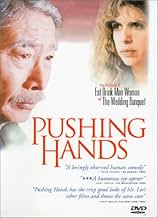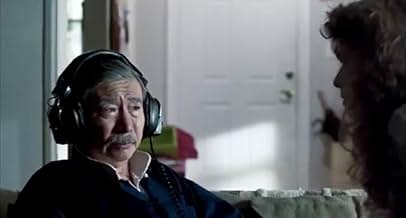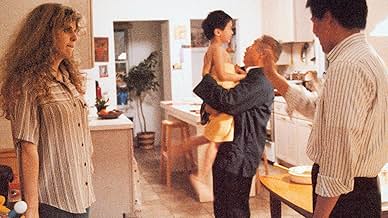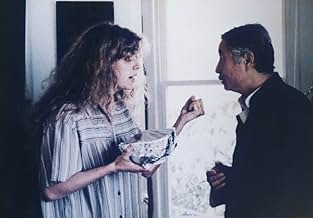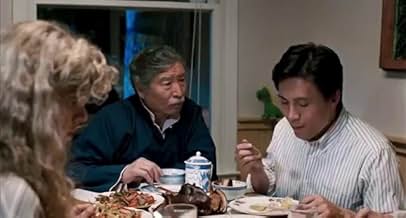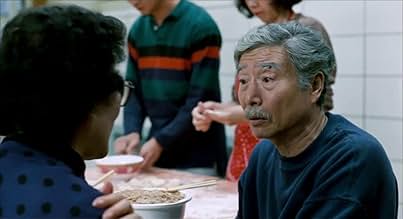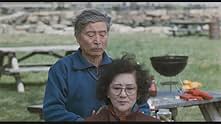ÉVALUATION IMDb
7,2/10
5,2 k
MA NOTE
Ajouter une intrigue dans votre langueAll the while, Master Chu tries to find his place in the foreign American world.All the while, Master Chu tries to find his place in the foreign American world.All the while, Master Chu tries to find his place in the foreign American world.
- Prix
- 6 victoires et 7 nominations au total
Bozhao Wang
- Alex Chu
- (as Ye-tong Wang)
Avis en vedette
When I was in class that day, I asked the students what did the "pushing hand" say? Almost all of them, including those who haven't seen "Pushing Hands", answer the collision between Chinese and Western cultures, so I wonder why it is so unified. After reading Baidu Encyclopedia, I understand! What is the "homesickness" is indeed the standard of the central idea, but there is no performance in the movie, and it is not allowed to pay for the payment.
Inserting a digression, about the very interesting thing about this film, on the day of the release of "Pusher", the box office was flat. On the same day, I won nine nominations at the Golden Horse Award, and after winning the best actor, supporting actress and special prize, the box office immediately after the next day. Big rise. It seems that we have to hear about it, only to know it. After reading the comments, we know what the movie is about?
"Pushing Hands" Virgo is often the most like the author himself, so "Pushing Hands" is very good, and the sharp parts are hidden under the gentle and popular narrative.
The whole film is staring at Lao Zhu alone, so look at "Pushing Hands" and see Lao Zhu.
Taijiquan Professor Zhuo-Taiji Pusher, in the words of Lao Zhu in the film, is: We practice the inner family, pay attention to refining the spirit, practicing the spirit, and waiting for the level of refining the spirit, it is very It's hard to practice again.
Lao Zhu is an old man who admits to lose.
I practiced pushing my hand to teach Lao Zhu at this level, but I feel that life has become utterly weak.
The loneliness and emptiness faced after retirement were all due to the reason that the son came to the United States, and the son married the wife of the foreign woman. All the pressure was passed on to his son and he could see it in the next minute.
So Lao Zhu did not accept his life and wanted to fight.
Teaching Tai Chi in Chinatown, the action after meeting Chinese Mrs. Chen is completely like a boy in first love.
Later, after the hope was shattered, Lao Zhu still refused to admit defeat and left home!
This "jailbreak" failed again. In the face of the humiliation of the restaurant owner, Lao Zhu's bloody Fang's defeat of the "enemy" still lost his cultivation.
Ang Lee's first feature film, compared to "Eat Drink Man Woman," is a bit too neat and plain, but it still possesses the characteristic traits of Lee's later films - quiet and plain, yet captivating. It's truly miraculous that if this son were placed in another director's film, he would undoubtedly be detested, yet under Lee's direction, he evokes a sense of weakness without crossing into detestable territory. "The sun is shining, and I just want to stand here for a while. After all, no one is waiting for me. I'll forget about it after standing here for a while." This reminds me of my grandmother, who moved from her hometown to the city and struggled to adapt. Two weeks later, she insisted on going back. During most of the daytime, she would just sit on the balcony, soaking up the sun. I wonder what she was thinking at that time. Initially, I thought it was about cultural barriers, but later I realized it was much sadder. Cultural barriers can be temporarily overlooked through the efforts of both sides, but time and aging are forces that cannot be resisted.
I do really love how when it comes to Ang Lee, there are no two films he's made that feel completely similar. He's up there with Spielberg when it comes to covering a wide variety of genres and tones, and maybe slightly more consistent, too. Pushing Hands was his debut, and while it reminded me a little of Eat Drink Man Woman in parts, it was still pretty different overall, in terms of its story and how it wasn't afraid to present a slightly heightened reality at times, too.
This does mean it's not as well balanced as Lee's 1994 film (and it doesn't hit as hard emotionally, either), but it does stand as a strong debut, and a film I mostly enjoyed quite a bit. It's a tiny bit rough around the edges, but only when you compare it to what Ang Lee was capable of doing just a few years later. Considering he was starting out here, it's a very confident and well-made debut.
Not all the humour hits, and some scenes end a bit abruptly. And as mentioned, the detours it almost takes into becoming a martial arts movie are unexpected (but will probably end up being one of the most memorable things about it). At its core though, it's a movie about family drama and the difficulties of growing old, and I think when it focuses on those things, it's quite effective. Lee's an empathetic filmmaker, and you always feel something for his main characters, and even in his debut, that's no exception.
While it's not one of his best films, I think it's still pretty easy to recommend and enjoy. I look forward to watching The Wedding Banquet soon, as I think that was his second film, and I've heard the general consensus is it's almost as good as the excellent Eat Drink Man Woman.
This does mean it's not as well balanced as Lee's 1994 film (and it doesn't hit as hard emotionally, either), but it does stand as a strong debut, and a film I mostly enjoyed quite a bit. It's a tiny bit rough around the edges, but only when you compare it to what Ang Lee was capable of doing just a few years later. Considering he was starting out here, it's a very confident and well-made debut.
Not all the humour hits, and some scenes end a bit abruptly. And as mentioned, the detours it almost takes into becoming a martial arts movie are unexpected (but will probably end up being one of the most memorable things about it). At its core though, it's a movie about family drama and the difficulties of growing old, and I think when it focuses on those things, it's quite effective. Lee's an empathetic filmmaker, and you always feel something for his main characters, and even in his debut, that's no exception.
While it's not one of his best films, I think it's still pretty easy to recommend and enjoy. I look forward to watching The Wedding Banquet soon, as I think that was his second film, and I've heard the general consensus is it's almost as good as the excellent Eat Drink Man Woman.
10bagua-2
Rarely have I seen the highest level of martial arts, internal kung-fu, portrayed in it's proper perspective. It is hard these days for people to realize that 'soft' style kung-fu will enable an old man to defeat many young men without much effort. With all the silly 'wire-fu' out there in the movies most people have no idea that there is a subtle way to defeat strength through 'chi energy' power lines.
There is no question that Ang Lee has the ability to put kung-fu back at the top of the martial art world. Through his well thought out story line and his perfect blend of drama and comedy he has taken a deep look at the struggle that exists today for thousands of people as they care for their elderly parents. This is truly a movie that can bond many generations.
There is no question that Ang Lee has the ability to put kung-fu back at the top of the martial art world. Through his well thought out story line and his perfect blend of drama and comedy he has taken a deep look at the struggle that exists today for thousands of people as they care for their elderly parents. This is truly a movie that can bond many generations.
Tuei Sho(Pushing Hands) is Ang Lee's first film after graduation, and the first episode of his "Triad of Father." In spite of its status as an early work, it manifests subtlety, elegance and articulation in narration style constantly seen in his latter works. Everyone, whether seen this film or not, can tell that it's about the bondage and gap of affection, relation and interaction within family, but it's more than that. It also tells about culture, not only the apparent differentiation, but the shift within a man's life, the time and the whole modern history of China. If you understand Chinese(language, culture and history), it is delicately overwhelming. If not, it's still amiable and a bit exotic. Tuei Sho is so worth viewing and contemplating again and again.
Le saviez-vous
- GaffesThe son, Alex, has physiognomy that is unmistakably that of someone Beijing, and the actor speaks with a Beijing accent, but the father, who demonstrates Taiwanese cultural practices, has the appearance of someone from farther south, such as near Shanghai. Regardless of whom the father might have married, the couple could not have produced a child with such Northern characteristics. This is a casting error more than a character error.
- ConnexionsFeatured in Century of Cinema: Naamsaang-neuiseung (1996)
Meilleurs choix
Connectez-vous pour évaluer et surveiller les recommandations personnalisées
- How long is Pushing Hands?Propulsé par Alexa
Détails
- Date de sortie
- Pays d’origine
- Langues
- Aussi connu sous le nom de
- Pushing Hands
- Lieux de tournage
- sociétés de production
- Consultez plus de crédits d'entreprise sur IMDbPro
Box-office
- Budget
- 400 000 $ US (estimation)
- Brut – États-Unis et Canada
- 152 322 $ US
- Fin de semaine d'ouverture – États-Unis et Canada
- 9 567 $ US
- 4 juin 1995
- Brut – à l'échelle mondiale
- 152 322 $ US
Contribuer à cette page
Suggérer une modification ou ajouter du contenu manquant


